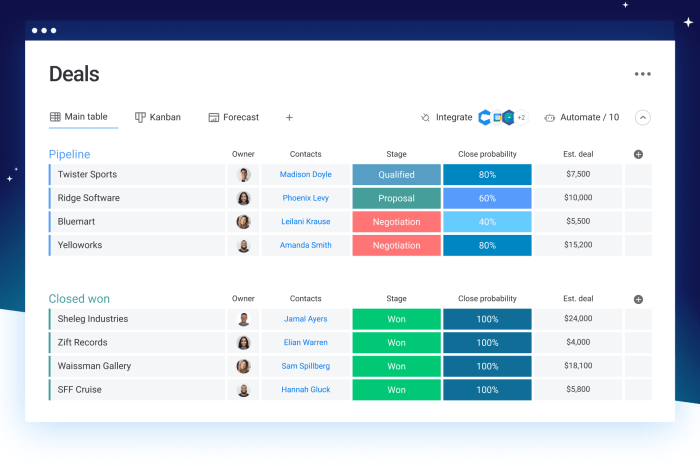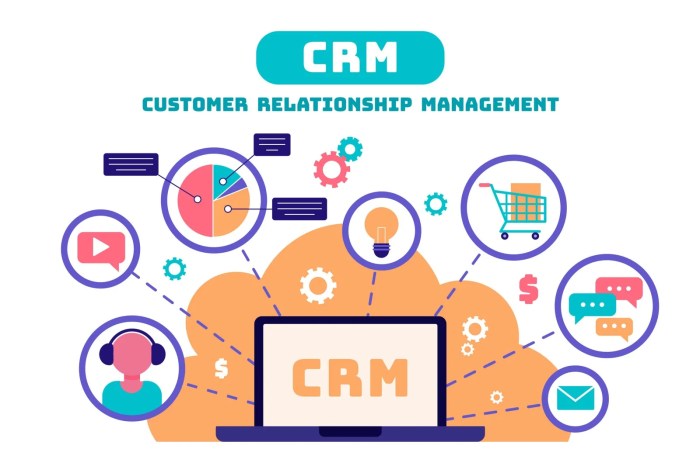Crm software and services – In today’s competitive business landscape, managing customer relationships effectively is paramount. Customer Relationship Management (CRM) software and services provide the tools and strategies to streamline this process, fostering stronger customer connections and driving revenue growth. This comprehensive guide delves into the intricacies of CRM, exploring its various facets, benefits, and considerations for businesses of all sizes.
Understanding CRM Software: More Than Just a Contact List: Crm Software And Services
CRM software is far more than a simple contact list. It’s a powerful platform designed to centralize and manage all interactions with current and potential customers. This encompasses a wide range of activities, from tracking sales leads and managing marketing campaigns to providing superior customer service and analyzing sales performance. Effective CRM implementation can significantly enhance efficiency, improve customer satisfaction, and ultimately boost profitability.

Source: cloudinary.com
Key Features of Modern CRM Systems:, Crm software and services
- Contact Management: Store and organize detailed customer information, including contact details, purchase history, and communication logs.
- Sales Force Automation (SFA): Automate sales processes, from lead generation and qualification to opportunity tracking and closing deals. This often includes features like sales pipeline management and forecasting.
- Marketing Automation: Automate marketing tasks, such as email campaigns, social media engagement, and personalized messaging. This improves efficiency and allows for targeted marketing efforts.
- Customer Service & Support: Manage customer inquiries, track support tickets, and resolve issues efficiently. Features like live chat and help desk integration are common.
- Reporting & Analytics: Gain valuable insights into customer behavior, sales performance, and marketing campaign effectiveness. This data-driven approach allows for informed decision-making.
- Integration Capabilities: Integrate with other business applications, such as email marketing platforms, e-commerce systems, and accounting software, for a seamless workflow.
Types of CRM Software: Finding the Right Fit
CRM systems come in various forms, each designed to cater to specific business needs and sizes. Choosing the right type is crucial for maximizing ROI.
1. On-Premise CRM
This traditional approach involves installing and managing the CRM software on your company’s own servers. It offers greater control and customization but requires significant upfront investment and ongoing IT maintenance. Data security is a key consideration.
2. Cloud-Based CRM (SaaS)
Cloud-based CRM, also known as Software as a Service (SaaS), is hosted on the vendor’s servers and accessed via the internet. This eliminates the need for on-site infrastructure and reduces IT overhead. It’s typically more affordable and scalable, making it a popular choice for many businesses. Popular examples include Salesforce, HubSpot, and Zoho CRM.
3. Open-Source CRM
Open-source CRM solutions offer flexibility and customization, as the source code is publicly available. This allows businesses to tailor the software to their exact needs, but it requires technical expertise for implementation and maintenance. Examples include SuiteCRM and SugarCRM.

Source: cloudmatric.com
Benefits of Implementing a CRM System
The advantages of using a CRM system are numerous and can significantly impact a business’s success. These include:
- Improved Customer Relationships: Centralized customer data enables personalized interactions and fosters stronger customer loyalty.
- Increased Sales Productivity: Streamlined sales processes and automated tasks free up sales representatives to focus on closing deals.
- Enhanced Marketing Effectiveness: Targeted marketing campaigns lead to higher conversion rates and improved ROI.
- Better Customer Service: Faster response times and efficient issue resolution improve customer satisfaction.
- Data-Driven Decision Making: Comprehensive reporting and analytics provide valuable insights for strategic planning.
- Improved Team Collaboration: Centralized information ensures everyone is on the same page, promoting better teamwork.
- Increased Revenue & Profitability: All the above factors contribute to increased revenue and improved profitability.
Choosing the Right CRM: Key Considerations
Selecting the right CRM system requires careful consideration of several factors:
- Business Size and Needs: A small business will have different requirements than a large enterprise.
- Budget: CRM solutions range in price from affordable options to expensive enterprise-level systems.
- Integration Capabilities: Ensure the CRM integrates with your existing business applications.
- Scalability: Choose a system that can grow with your business.
- Ease of Use: Select a user-friendly system that your team can easily adopt.
- Customer Support: Reliable customer support is essential for resolving issues and getting the most out of your CRM.
CRM Implementation and Training
Successful CRM implementation goes beyond simply choosing the right software. It requires careful planning, data migration, and comprehensive user training. A phased rollout approach can minimize disruption and ensure a smooth transition. Regular updates and ongoing training are crucial for maximizing the system’s potential.
Frequently Asked Questions (FAQ)
- Q: What is the cost of CRM software? A: CRM software costs vary widely depending on the features, vendor, and deployment model (cloud vs. on-premise). Some offer free plans with limited features, while enterprise-level solutions can cost thousands of dollars per month.
- Q: How long does it take to implement a CRM system? A: Implementation time varies depending on the complexity of the system and the size of the business. It can range from a few weeks to several months.
- Q: What are the key metrics to track with a CRM? A: Key metrics include customer acquisition cost (CAC), customer lifetime value (CLTV), sales conversion rates, customer churn rate, and customer satisfaction (CSAT).
- Q: How can I ensure data security with a CRM? A: Choose a reputable vendor with strong security measures. Implement robust access controls and regularly back up your data.
- Q: What is the difference between operational and analytical CRM? A: Operational CRM focuses on automating business processes, while analytical CRM focuses on analyzing data to gain insights and improve decision-making.
Conclusion: Embrace the Power of CRM
CRM software and services are indispensable tools for businesses seeking to improve customer relationships, boost sales, and drive growth. By carefully considering your needs, choosing the right system, and implementing it effectively, you can unlock the full potential of your customer data and achieve lasting success.
References:
Call to Action: Transform Your Customer Relationships Today!
Ready to elevate your customer interactions and drive significant business growth? Contact us today for a free consultation to explore how a customized CRM solution can benefit your organization.
Questions and Answers
What is the difference between cloud-based and on-premise CRM?
Cloud-based CRM is hosted on a provider’s servers, offering accessibility from anywhere and automatic updates. On-premise CRM is installed on a company’s own servers, providing greater control over data but requiring more IT management.
How much does CRM software cost?
CRM pricing varies widely based on features, number of users, and vendor. Options range from free, limited versions to enterprise-level solutions with substantial monthly or annual fees.
How long does it take to implement CRM software?
Implementation timelines depend on the complexity of the system and the size of the organization. Smaller implementations might take weeks, while larger ones could take months.
What are some key features to look for in CRM software?
Essential features include contact management, sales pipeline management, marketing automation, customer service tools, reporting and analytics, and integration capabilities.
